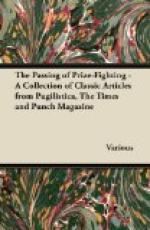Quackery is of more ancient birth than many very honest people suspect; nay, more than, were the register of its nativity laid before their eyes, they would be willing to admit. We have no space for its voluminous history; but it is our belief, since quackery first plied its profitable trade with human incredulity, it never perpetrated so successful a trick as that exhibited by Sir ROBERT PEEL in his motion of want of confidence. The first scene of the farce is only begun. We have seen how Sir ROBERT has snatched the cards out of the hands of the Whigs, and shall find how he will play the self-same trumps assorted by his opponents. A change is already coming over the Conservatives; they are meek and mild, and, with their pocket handkerchiefs at their eyes, lisp about the distresses of the people. “When the geese gaggle,” says a rustic saw, “expect a change of weather.” Lord LONDONDERRY has already begun to talk of an alteration of the Corn-laws.
“Who knows what a minister may be compelled to do?” says Lord LONDONDERRY. These are new words for the old harridan Toryism. She was wont, like Falstaff, to blow out her cheeks and defy compulsion. But the truth is, Toryism has a new host to contend with. Her old reign was supported by fictitious credit—by seeming prosperity—and, more than all, by the ignorance of the people. Well, the bills drawn by Toryism (at a long date we grant) have now to be paid—paper is to be turned into Bank gold. Arithmetic is a great teacher, and, with the taxman’s ink horn at his button-hole, gives at every door lessons that sink into the heart of the scholar. Public opinion, which, in the good old days “when George the Third was king,” was little more than an abstraction—a thing talked of, not acknowledged—is now a tangible presence. The said public opinion is now formed of hundreds of thousands whose existence, save in the books of the Exchequer, was scarcely admitted by any reigning minister. Sir ROBERT PEEL has now to give in his reckoning to the hard-heads of Manchester, of Birmingham, of Leeds—he must pass his books with them, and tens of thousands of their scholars scattered throughout the kingdom; or, three months after the next meeting of Parliament, he is nought.
At this moment, it is said, Sir ROBERT is studying what taxes he can best lay upon the people. We confess to the difficulty of the case. At this moment there is scarcely a feather so light, the addition of which will not crack the camel’s back. No; Sir ROBERT will come to the Whig measures of relief, having so disguised them as, like Plagiary’s metaphors, to make them pass for his own. The object of himself and party is, however, attained. He has juggled himself into place. With the genius of his former existence, as TEUFELSKOPF, the Premier has shuffled himself into Downing-street; and there he will leave nothing untried that he may remain. “If Cato gets drunk, then is drunkenness no shame”—“If Sir ROBERT PEEL alter the Corn-laws, then is it proper that the Corn-laws should be changed.” This will be the cry of the Conservatives; and we shall see men, who before would have vowed themselves to slow starvation before they would admit an ear of wheat from Poland or Egypt, vote for a sliding-scale or no scale at all, as their places and the strength of their party may be best assured.




